























































































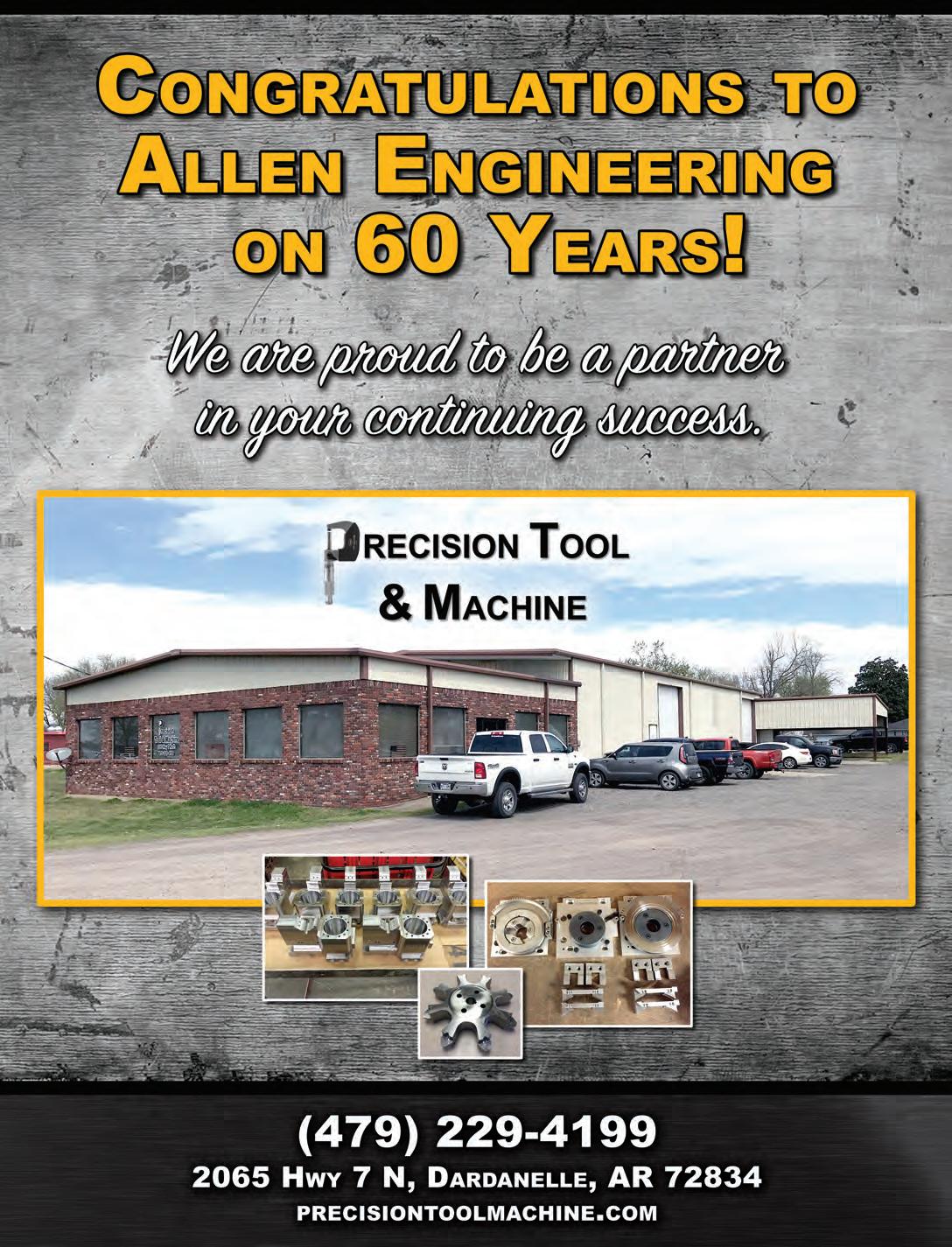


























































































hen J. Dewayne Allen, co-founder of Allen Engineering Corp. (AEC) in Paragould, Ark., passed away in 2020, his wife and business partner, Mary Ann, could easily have walked away from running the compa ny she and her husband first started in 1964. After all, their son, Jay, who has worked at the family company for more than 30 years and is familiar with every aspect of the business, succeeded his father as AEC’s chief executive officer and part owner.
Instead, Mary Ann prefers to come to work each day and continue as chair of AEC’s board of directors. That allows her to stay close to the heart of the 60-year-old company, which specializes in designing, manufacturing, distributing and marketing the Allen line of concrete and related

equipment sold across the United States and abroad. Since AEC marked its 50th anniversary in 2014, Allen said she has witnessed changes in how the company operates, although she considers them all to be positive.
“When Dewayne was here, the focus was on innovation and new products,” she said. “He was down there in the middle of fixing something or trying to invent something new. Now, with Jay having been a business major in college, he has been able to make it into a corporation instead of just a little shop grown big. We’re now a bottom-line-focused business that can do all the things we want to do as a supplier, while continuing with a heart and passion for the industry.”


We’re now a bottom-line-focused business that can do all the things we want to do as a supplier, while continuing with a heart and passion for the industry.”
Mary Ann Allen


om in c o in br Caden , sur ance cial insur mmer tion es na age servic oker allag , A G ance e Insur nc
e a W ally and globally ers , deliv ompany gher C
ee ben y , and emplo ety
efits try leader e an indus r dtandar t s the highes













For his part, Jay Allen pointed to a few other differences in the company since 2014, including AEC’s implementation of an active and functioning fiduciary board made up of three outside directors and three Allen family members, which, he said, gives AEC “real accountability in its governing” and allows it to operate better.
“It’s unusual for a privately-owned company to run in this manner, but it gives us a lot of input at the highest level of the business,” he said.
Allen added that the concrete equipment manufacturer has layers of professional leadership — representing finance, administration, sales and marketing, operations, supply chain logistics, engineering and product development — that are always working to improve the business.







A new R&D area is now located at the very center of the facility. This is where engineers, fabricators and assembly associates bring together their collaborative ideas for machines of tomorrow.
By employing an entrepreneurial operating system (EOS) to establish an efficient structure within AEC, Allen said, “We know at each level what we are supposed to be doing on a daily, weekly, monthly and quarterly basis.
“The idea behind this is to push accountability and responsibility down through the organization so that, hopefully, many of the key decisions are made by our shop floor associates.”
Allen Engineering also works to find executives and associates that it feels can work well within its company culture. When it decides to interview new people, AEC uses a personality profile to help determine what its potential associates enjoy doing and where their best fit best may be.


“I am most proud of the fact that we have worked to make our company a place where our associates feel like family,” he said. “They know they are cared for and that we want to do the right thing.”
Jay Allen


HISTORY from page 9
For example, AEC has two chaplains working part time through AEC Cares, an in-house benevolence ministry. It also is designed to help AEC’s people and their families get through tough times. That could include the company helping an associate navigate a range of issues, from paying their power bill to taking care of a medical expense, Allen said.
On the business side, AEC has worked hard to expand its business and to enlarge its footprint.
“Since 2014, we have promoted paving equipment, bridge deck finishers, triple roller tube pavers, polyester concrete pavers and other specialty pavement equipment that we make,” Allen said.
In addition, AEC has recently moved into making ride-on concrete polishers and polishing diamond tooling.
“Ten years ago, our concrete paving products represented probably three percent of our revenue,” said Allen. “Now, it’s around 10 percent. Concrete finishing is our biggest category today and represents close to 60 percent of our revenue. We are best known for our power trowels and ride-on trowels, and they are our biggest category, but we have intentionally been diversifying from that as well. Not that we aren’t investing and making better trowels, but we just don’t want them to be all we make.”
AEC’s changes over the past decade have succeeded, evidenced by the fact that it made approximately $63 million in sales last year — double its business from 2014, he said. CEG





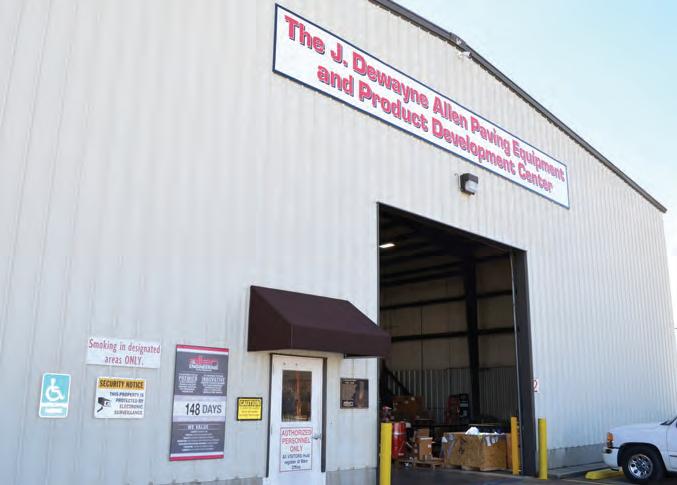
The driving force behind the success of Allen Engineering Corp. (AEC) since it opened its doors in 1964 was J. Dewayne Allen, a man whom his son, Jay, described as “brilliant” and “ahead of his time.”
Following Dewayne’s death in November 2020, Jay Allen was named as AEC’s CEO and part owns the company with his mother, Mary Ann Allen.
But make no mistake, despite his passing, Dewayne Allen has continued to remain a largerthan-life presence inside AEC and across the industry as a whole.
“I like to say that he could see around corners that most people could not,” Jay said. “He could foresee the opportunities and needs of the business. Plus, he just loved concrete and contractors; in fact, he was at his best in front of prospects.
“For instance, at World of Concrete over the years, contractors brought their problems or challenges to him, and he would
come up with solutions for them. No matter how wacky the problem may have been, he would devote a fair amount of time to fixing it even though it didn’t make him any money.”
To Dewayne Allen, the challenge of finding a solution was the thing, and Jay said his father was not happy when there were no challenges in front of him.

“That was the fuel for his fire and although he was super driven, Dad had a kind and gentle side to him too,” he said. “Back in 2020 at his memorial service, I was amazed at the number of AEC associates that were very emotional about his passing and the impact that he had had on their lives. Even though he was a tough man, he loved and cared about them and wanted to help them be the best version of themselves. He always wanted to push and challenge people to do things they probably didn’t think they could do.”




The younger Allen also recalls his father’s willingness to be a risk-taker.
“He was not afraid to push and prod, and if he got to a dead end, he would pivot and go in another direction — that’s who he was. I remember when I got into this business, after graduate school and being in the banking industry for seven years, I realized he was betting the farm on this business about once a year — something you don’t want to do, but, somehow, he did it and succeeded.”

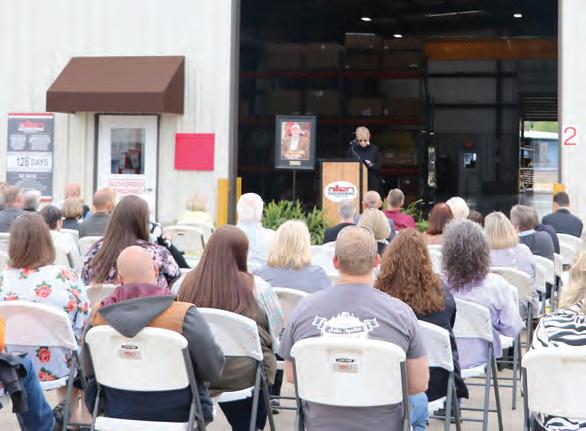
The risks of running and growing a manufacturing company simply did not mean as much to Dewayne Allen as pursuing his passion to invent and engineer machines to help his customers succeed in their businesses, Jay said, adding that his father’s mentality was if he continued to devise well-engineered equipment, the business part would take care of itself.
“My dad was not a businessman in the traditional sense, but business success followed his leadership,” he said. “We built some cool stuff, and he was prolific in his patents. Ultimately, though, in today’s industrial climate, you must have a financially sound business to support all that you are trying to do. We’re still super innovative and are currently building a half-dozen new concrete products. I make sure we’re always pushing the envelope and producing new stuff.”
When Dewayne’s widow, Mary Ann, was asked recently about what kind of man he was, she said that he was “intense and focused on this business.”
She agreed with Jay that his rough demeanor often belied the side of him that cared about everyone.
His family also noted that besides being an innovator, Dewayne was the ultimate performer and could be hilarious during AEC’s product presentations.
“Here’s a funny story,” Jay said. “One year at a trade show, we brought a triple trowel equipped with three rotors and three engines — a real beast. It had a nightmarish design, but Dad wanted a triple trowel. So, we did an unveiling in the booth, the press was there, and someone yells, ‘Start it up Dewayne!’ He starts up the trowel, something you aren’t supposed to do indoors with people everywhere in this convention center. Smoke is billowing out of the machine and everyone’s running over saying, ‘Hey, you can’t do that!’ Dewayne calmly said, ‘Why not? It’s my booth, and my machine. I’m going to run it!’”
His son added, “When he was on his game, he was fantastic. There was no one I would rather be with when he was in his element, which was mostly on the road, at a trade show or on a job site. If he was here at the office sitting behind the desk, he wasn’t as happy.” CEG
Long known as a premier maker of innovative and well-built concrete equipment for contractor use, Allen Engineering’s product lineup is designed to withstand the most challenging jobsite conditions.
From its 173,000-sq.-ft. manufacturing plant in Paragould, Ark., AEC produces a range of machines for placing, finishing, polishing and paving all types of concrete.
To assist in that, the company employs a roster of talented designers and engineers that develop and build its concrete and related equipment for sale across the United States and overseas.

Among them are power buggies, tracked rider dumpers, screeds, ride-on power trowels, four types of ride-on concrete polishers and a series of pavers and finishers.
Allen Engineering’s in-house operations include not only equipment design and engineering, but prototyping, testing, computer numerical control machining, in addition to metal fabrication, laser metal cutting, welding, powder coat painting, assembly, warehousing and distribution.
Over the past several decades, the manufacturer has maintained a leading role in the evolution of high tolerance concrete floors around the world. It also was the first company to put floating discs under a ride-on power trowel, an innovation that led to a significant improvement in the flatness of concrete floors.
Because of the workmanship and attention to detail it applies to all its machines, AEC counts many of the world’s major concrete contractors among its satisfied customers.
After being developed and refined over the past few years, AEC’s concrete polishing equipment model line has recently been introduced to the marketplace — a move that Jay Allen, the company’s chief executive officer, called “a real game changer” for AEC. Included in that is the manufacturer’s unique ROP150-B, the maker’s first battery-powered, purpose-built ride-on concrete polisher.
see LINEUP page 18


“The technology is brand new and super innovative. Allen Engineering brought out the very first lithium-ion wheel buggy approximately five years ago, and its reliability continues to increase every year.”
Jay Allen








• 24/7 Conci • Custom En • Diesel & N
erge Support - No Down Time gineered Power Solutions
success we've cons Contact us to disco
over how our services can
sistently delivered to industry
1-855-CKPOWER


Allen Engineering,
amily to yours, co u d
atural Gas Engines ongratulations on 60 years!
Y Yeea r s ngineering! o n cu
l eaders . Follow in the footste p s of indust Contact us today to dis c your OEM equipment needs. power t ra i n com p onents en gi nee w ithstand the tou g hest conditio by expert support and tailore d s
Hayes proudly stan d s as a truste of , providing du ol utions. backed ed to r rable t ne r pa r u ss y r ns,


















This TX. family to Houston, ed his v yne Allen mo aDew 1976
o- e intr er e they w is wher
eeds. russ Scr duced to T



em mobile home on pr AR in aragould, to P

The Allen Family mo 196 t mise nto a ved 68
This compa established Allen-Hardi 1964
Allen Engin




ed ba
ee began manufacturing Scr e th ÅR wher aragould, to P

.ory



eader and Spr aters, Fine Gr


The Allen Family mo s. d, ey of the fac
TheAllenFamilymovedba 197 eering. any became AR. in Piggott, n Ready-Mix k ck 7 fthft








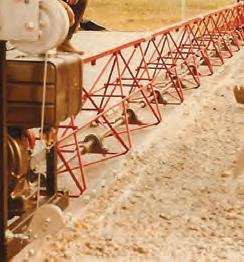




rowels. Riding T Steering on their aulic oduced Hydr intr Allen Engineering 1997


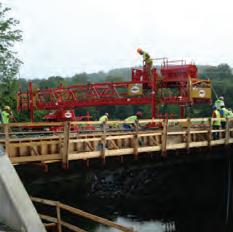































Brridge Deck the Model 12 Alllen Engine






1 .Finisher oscillating oduced ering intr row Riding T oduceintr Allen E el models. w ed their first ngineering 1987

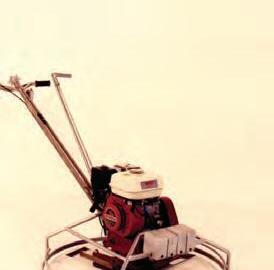







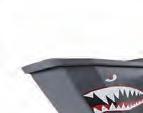




































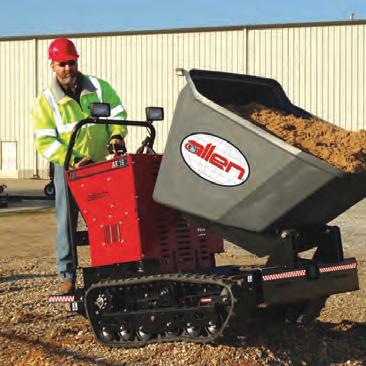

















LINEUP from page 13
Its engine runs off 48-volt, lithium-ion batteries, has a polishing width of 68 in. and is designed specifically to maneuver in tight indoor job sites.
“These machines eliminate exhaust fumes when working inside a warehouse or a box store,” said Allen. “Typically, propane machines are used indoors, but we offer battery-powered units that produce zero emissions.”
AEC’s model ROP150-B polisher can operate for approximately four hours between charges and, if needed, a contractor can either bring in a second fullycharged machine or quickly put in a backup battery pack, which provides six to eight hours of run time on the job, before being recharged overnight.
Allen said that the polisher’s power pack utilizes Vanguard battery technology, which he explained has worked very successfully in other AEC products.


“We are excited to add more tracked buggies and dumpers to our offering as well as drive into new markets with this partnership.”
Jay Allen





“The technology is brand new and super innovative,” he said. “Allen Engineering brought out the very first lithiumion wheel buggy approximately five years ago, and its reliability continues to increase every year.”
He added, “Among the current scope of environmentally friendly job sites, such as retail, hospital and school renovations, where the specifications for any enclosed work areas require no emissions, AEC’s polishers have proven to be an invaluable investment. Even certain municipalities, particularly those in the Northeast United States, are seeing these machines being put in the specs of certain bids for zero emissions.”
With concrete buggies and rider dumpers having become such a big part of the concrete industry worldwide, AEC announced in January 2024 that it had entered into a partnership with Messersi, S.p.A., based in Ancona, Italy, to become the European manufacturer’s master distributor of its product line in North America.
Like AEC, Messersi also is renowned for its compact construction equipment, with its products ranging from minidumpers and track carriers to compact loaders and miniexcavators.
Messersi’s machines will be co-branded under the name Allen by Messersi and will include both tracked buggies and tracked dumpers, Allen said, while Allen Engineering will continue to produce its own lineup of wheel buggies, many of which have been very popular among U.S. contractors for years.
“We are excited to add more tracked buggies and dumpers to our offering as well as drive into new markets with this partnership,” he said. CEG
t is not surprising that a company started 60 years ago by Dewayne Allen, a talented inventor and innovator of well-made machines for use in the concrete trade, has never shied away from embracing new, 21st century technologies.
Allen Engineering Corp. (AEC) has built its reputation among concrete contractors by constantly searching for the latest methods and designs to build its various product lines — from power buggies and screeds, to trowels, ride-on concrete polishers and pavers.
By providing the most efficient technological advances on its products, AEC is able to fulfill one of its primary goals: to remove any difficulty from its machines that could hinder its customers on a job site, said Dewayne’s son, Jay, who became AEC’s chief executive officer in 2022 following his father’s passing.
“We exist to take away their pain on a project,” he said. “I would say without exception, if you were to interview 100 contractors, 95 of them are going to say they can’t get enough skilled and unskilled labor to work the jobs. So, 100 percent of our focus now is to produce efficient machines for a more mechanized process to make work easier and faster on the job site.”

AEC understands that its customers already work in grueling conditions; it is often hot and dangerous and demands concrete crews toil long hours — sometimes throughout the night.
“There is not a lot of glamour involved in the trade,” he said, “but we try our best to design and engineer machines that provide them with ease and efficiency.”

Therefore, Allen noted that technologically advanced manufacturing with a simplified intuitive process — possibly one day including artificial intelligence — is what will continue to make AEC successful. The equipment maker also has applied mechanization and labor savings on its Paragould, Ark., factory floor.
But, he cautioned, no one on his skilled team of employees will lose their jobs as a result.
“They are far too valuable to us for that to happen,” Allen said.
“We spent $2.5 million in 2023 alone in our plant and everything we bought had an automation component to it,” he added. “You can’t really say it is becoming robotic; rather, it is just a single operator having the ability to do quicker operations without the assistance of other team members.”
The family-run company, which includes his mother, Mary Ann, AEC’s part owner and board chair, also decided the manufacturing facility should continue to be operated using an asset-heavy model, Jay Allen said, “where we fabricate, weld, machine, paint, assemble, design and engineer our products — all in-house.”
Allen noted that technologically advanced manufacturing with a simplified intuitive process — possibly one day including artificial intelligence — is what will continue to make AEC successful.


This method is in contrast to asset-light manufacturing favored by many other companies, he said, where all the same factory floor processes “are completed in another country, shipped back in containers and final assembly is done in the States so it can be tagged as ‘Made in America.’ We have chosen not to do it that way.”
AEC also prefers its methodology because it can better control the quality of its output and react quickly to change. A good example of the latter was seen during the pandemic when many of the manufacturer’s competitors struggled to get parts and products that were either stuck in ports or simply unable to be shipped at all.
Allen Engineering’s design-engineer teams are currently delving into the creation and use of plug-and-play adaptability for adding laser equipment to some of its machines for maximum accuracy and comprehensive grade control, according to Allen.
One of the more intriguing projects they have been perfecting, he said, involves implementing remote-control capabilities in many of AEC’s products.
The Allen TRTP275 Triple Roller Tube Paver, for instance, allows its operator to take it through its paces remotely while standing a short distance away from the model. At the same time, a remote-controlled concrete pump can be operated with another controller.
“This method of concrete paving might become the wave of the future in regard to precision and accuracy on pours,” Allen said. “It had been a request from contractors for some time now. It makes it easier to see what’s going on with the job by being a bit removed from the machine.”
Another relatively new offering gaining in popularity among many AEC’s concrete customers is the manufacturer’s two Versatile Light Paver (VLP) models. Designed for railroad platform construction, these machines are used primarily on transit projects as well as for light and heavy rail. Allen said that they essentially combine a bridge finisher with a truss screed.
The VLP2424 model, for example, has worked successfully on several rail projects on the West Coast, he said. CEG
When Allen Engineering Corp. (AEC) celebrated 50 years in business in 2014, the company implemented a rather bold strategy designed to continue its financial success as well as expand its presence in the global marketplace.
The Arkansas-based concrete product manufacturer’s “50-in5” growth plan aimed to increase AEC’s revenues by $50 million in five to seven years, said current company CEO Jay Allen.
Despite market uncertainty, particularly during the pandemic, AEC managed to hit that goal in 2021. Allen said that the mark was reached due to “tremendous” growth in the previous few years and, oddly enough, was also helped along by COVID-19.
“During COVID everyone stayed home and ordered things online,” Allen said. “But the U.S. did not have enough infrastructure in place for every household in America to buy their stuff online and have brought to their doorstep. A tremendous number of distribution facilities needed to be built in order to deliver on that promise, many of which were for large-scale retailers.”
As a result, AEC benefited because concrete placement and finishing products were in high demand to help construct more large warehouses and distribution centers, he said.
In 2024, having reached 60 years as a leading manufacturer and with the pandemic much less of
In 2024, having reached 60 years as a leading manufacturer and with the pandemic much less of a threat worldwide, AEC has taken steps to capitalize on the preference by equipment dealers to purchase their machines and parts online.

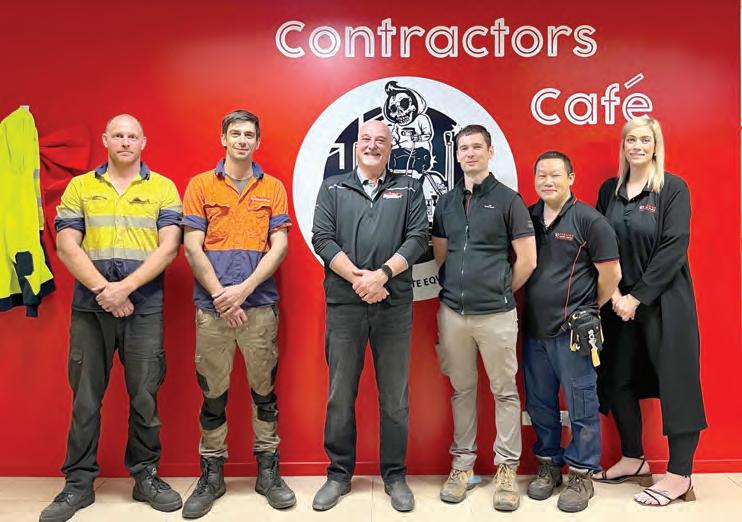



a threat worldwide, AEC has taken steps to capitalize on the preference by equipment dealers to purchase their machines and parts online. In the coming months, the company will be introducing its new online store for dealers and rental centers to make their purchases.
According to Allen, the service is just one part of AEC’s new global strategy focused on distributing its concrete products across the planet.
“Global distribution is becoming the key to that strategy,” he said. “Another of our biggest innovations is striking a deal for controlling interest in Premier Concrete Equipment, our master distributor in Southeast Asia and based in Brisbane, Australia. The operation is run by a former Allen Engineering employee from Arkansas.
“This endeavor takes up a lot of our time and resources,” Allen said. “We have people going down there quite a bit to help support him. It’s a long way from here, but it’s worth it. We have considered this same model in other areas as it’s very much a consultative sell, and all about helping contractors achieve really good results on their floors using laser screeds and ride-on power trowels.”
He said it also is a very technical sell because AEC views the remaining portions of Asia as a challenge due to “the flood of cheaply built and technologically inferior products.”
In addition, AEC is looking to expand to Latin America with an eye to growth in Mexico and points south.
“Having original equipment manufacturing competitors with good products in Europe, though, makes that region a bit more



(L-R): With Jay Allen are Don D’Angola, Mario D’Angola and Chris Keen, owners of Azzurri Concrete based in Sydney, Australia. Azzurri uses Allen ride-on power trowels to place and finish concrete on its large concrete placements all around the metro Sydney area.
challenging for us,” Allen said.
In thinking globally and formulating a strategy to succeed on the worldwide stage, he said it is incumbent upon a company to look at what OEM players are its competition and how they plan to position themselves.
“I think I counted 10 other power trowel manufacturers this year, some of which I had never heard of before,” Allen said. “Many have staying power, and some will be at one or two trade shows, after which you won’t see them again. They come in to test the market and will pull back if they are not successful. We take them seriously and don’t dismiss them because we know that, especially at the low end of the market, they can make a good product that is competitive. AEC takes all of this into consideration and essentially goes ‘up market’ to produce more complex, more full-featured machines.” CEG
In the mid-1990s, as Allen Engineering Corp. (AEC) had matured and grown to become one of the most popular concrete equipment makers in the United States, owner and founder Dewayne Allen realized that his customer base needed to be better educated in how to get a maximum return on their investments.
Along with Harry Horn, one of AEC’s top salespeople at the time, Allen started the Allen Concrete College (ACC) to train contractors on how best to utilize the AEC machines they bought to work on their job sites.
Allen and Horn were firm believers that showing their customers the proper ways to use their concrete equipment would not only improve their output but keep those contractors coming back to AEC repeatedly.

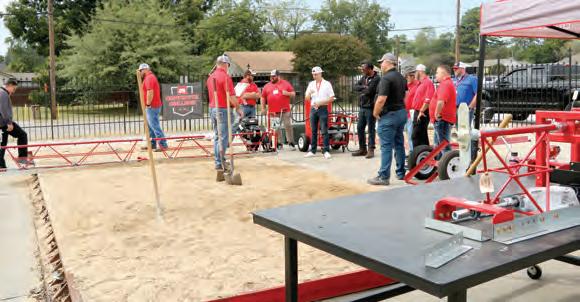
“The ACC has really been great for us,” he added. “In fact, I would say the program is a key driver of the customer loyalty that we enjoy among concrete contractors.”
The educational sessions combine a classroom seminar and hands-on training in concrete placing and finishing techniques to produce high F-number floors. Contractors and crew members learn how to increase the flatness and levelness of the floors, the basics of concrete flooring mix design and the F-number system, which uses floor surface curvature calculated from elevation differences over 24-in. increments as a measure of flatness.
“The
After initially setting up product demonstrations in the spring and summer, AEC’s sales team took charge of holding the training sessions and the program has since become one of the manufacturer’s most successful customer-relation efforts.
“The college has helped to educate thousands of contractors since 1995 and offer them tips on getting the absolute most from our machines,” said Jay Allen, AEC’s current chief executive officer and the successor to his father, Dewayne, who passed away in 2020. “The program is also a way to bring customers to our Paragould, Ark., manufacturing plant to see how well the machines are constructed and the quality of people behind the equipment.

Unfortunately, with the outbreak of the pandemic in 2020, Allen Engineering was forced to shut down the ACC course work for a while, Allen said, and only started holding the training again in the past year or so.
“What we’ve done so far is some in-house dealer training, some knowledge training for our customers and we have plans to bring back the live concrete pour demonstrations later this year,” he said. “In addition, we are looking to possibly partner with a laser screed manufacturer and hopefully provide some type of certification for the contractor after completion of the class — perhaps an American Society of Concrete Contractors [ASCC] or an American Concrete Institute [ACI] certification.
“We are working on that right now and we still get a lot of requests for the concrete college program.” CEG








HYDRAULICS ~ PNEUMATICS ~ AUTOMATION ~ SYSTEMS ENGINEERING
HYDRAULICS
NFPA MEDIUM AND HIGH PRESSURE CYLINDERS
DIRECTIONAL AND PROPORTIONAL VALVES
PUMPS, MOTORS, HYDROSTATIC DRIVES
PRESSURE • FLOW CONTROLS/DIVIDERS
SUBPLATES • MANIFOLDS
PACKAGED AND CUSTOM POWER UNITS
OIL FILTRATION, TESTING AND MONITORING SOLUTIONS
MOBILE STACK VALVES • HEAT EXCHANGERS
FITTINGS • TUBING • HOSE ASSEMBLIES
LEVEL GAUGES • TANKS • ACCESSORIES


PNEUMATICS
LINEAR • ROTARY • RODLESS ACTUATORS
STEPPER AND SERVO ACTUATORS
AIR PREPARATION • DRYERS
FIELDBUS AND WIRELESS DIRECTIONAL VALVES
PRESSURE AND FLOW SWITCHES
PROCESS CHILLERS
VACUUM
FITTINGS • TUBING • FLOW CONTROLS

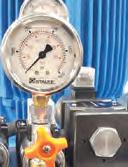

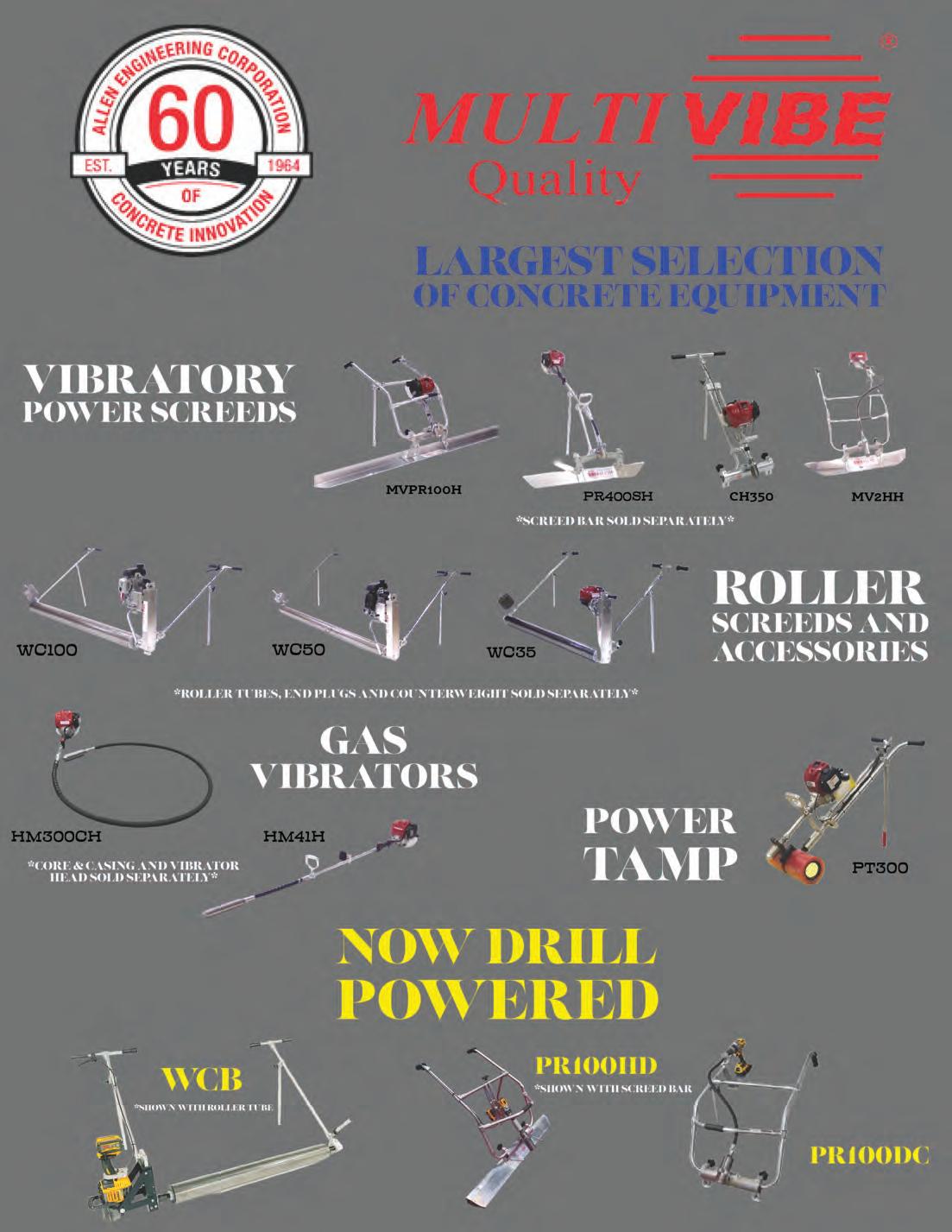







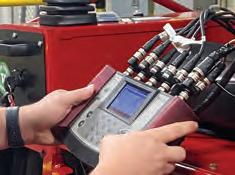










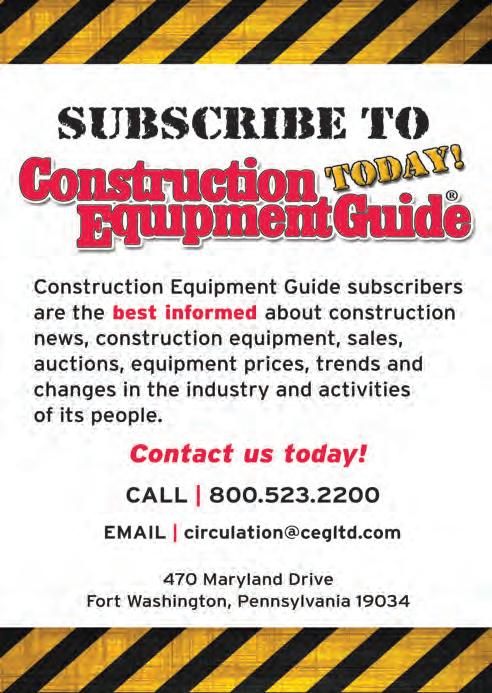
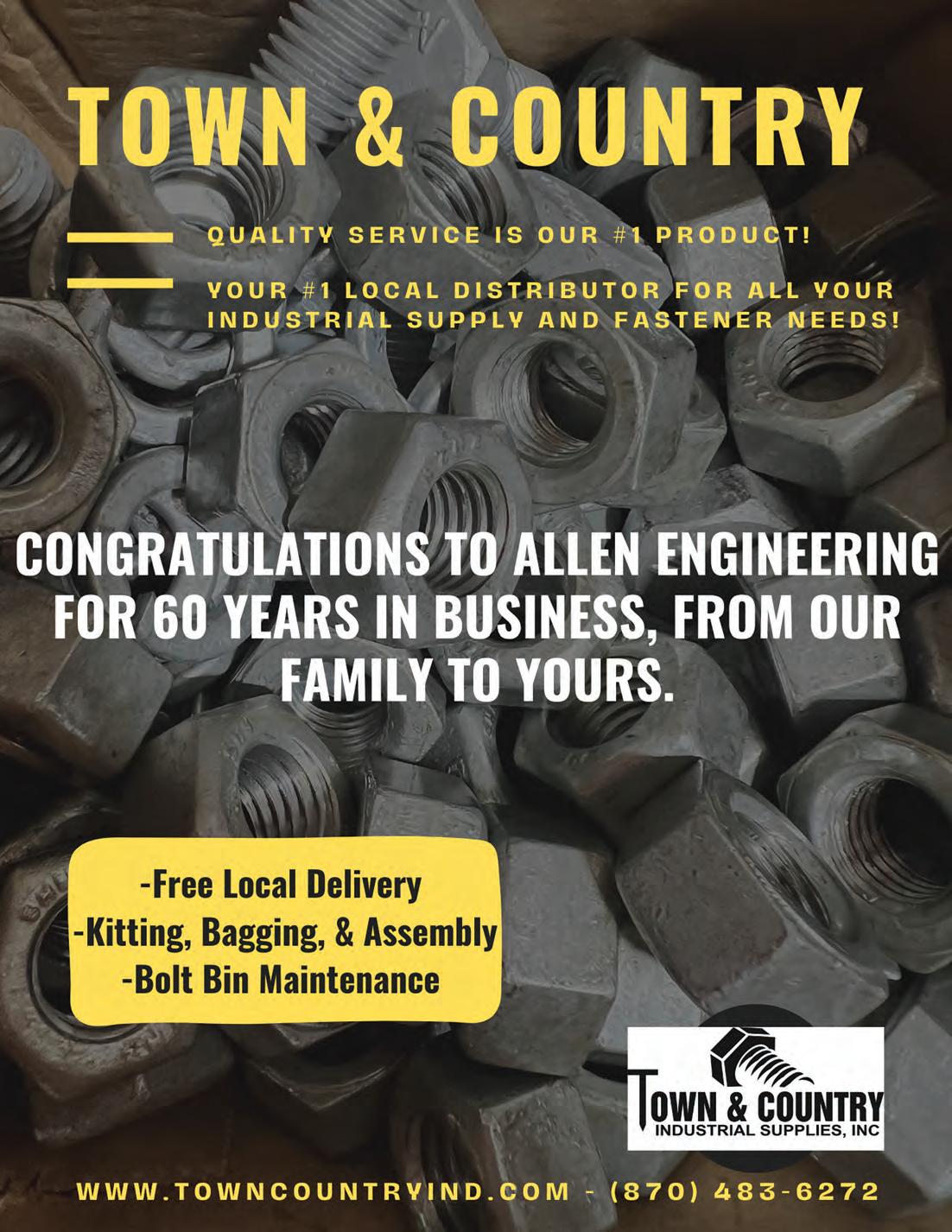
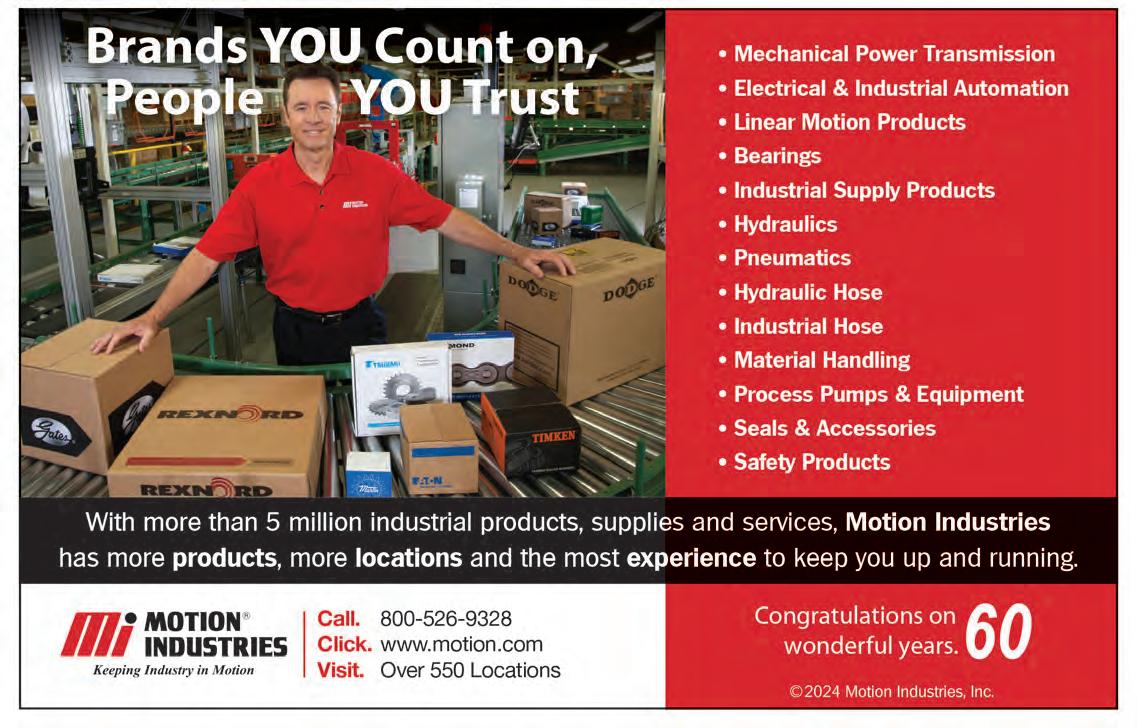









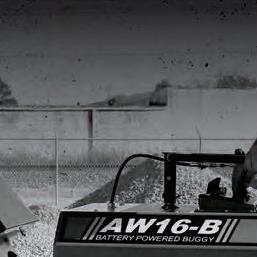


































































tun ppor f o t o se q d e powere - y er y . e o b t t uil e b r s a ystem .Ourfixedandswappable fAllen’sequipmentwithan atches , m ulcollaboration tise, siteremain.Ourexper f s o hallenge e c h t t Bu nities hole ns a w pe t o uipmen

y s ter at n b io - m ystem y s ter bat niqueneedsof fu iththought g w ob e j nth g o erin



t e i rov s p g u lettin nd , a afer , s ter mar

© 2024 Briggs & Stratton. All s ved. for you Thank ougher. rights reser t


















